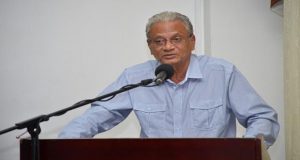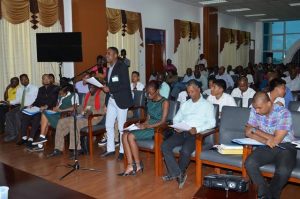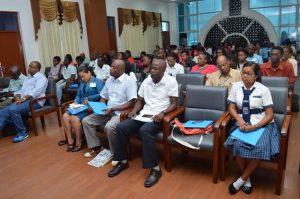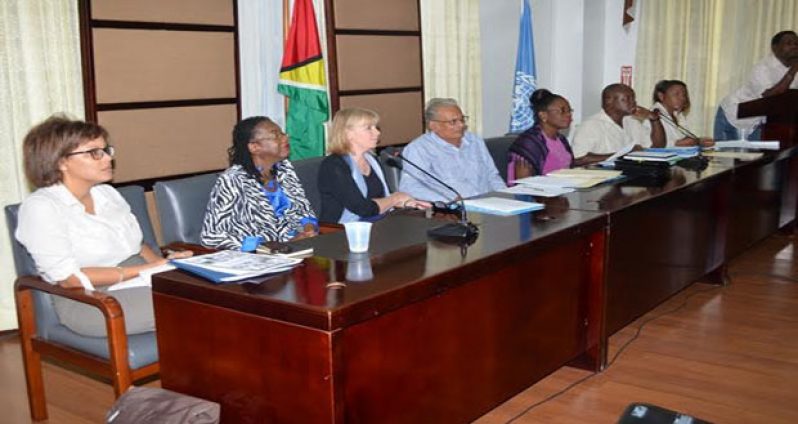STICKING to its 100-day commitment to improve the situation of youths in Guyana by the implementation of a National Youth Policy, the Government of Guyana, through the Ministry of Education, has brought together a wide cross section of youths and private and civil society members for a two-day working session, aimed at advancing the process of finalising a National Youth Policy and discussing the broad themes of a National Youth Action Plan. Day one of the session opened yesterday at the Arthur Chung International Convention (ACIC) Centre, Liliendaal, with Minister of Education Dr. Rupert Roopnaraine charging the youths present to become crusaders for national reconciliation.

National Youth Policy working session at the Arthur Chung International Convention Centre
The Minister said that in his mind, there is no more sacred task confronting youths and Guyana than that of healing of the nation.
“We have a nation that is always hovering on the brink of self-destruction, we need to heal this…we need to reconcile,” Minister Roopnaraine said, speaking of the division that has characterised Guyana since the 1960s.
Dr. Roopnaraine pointed out that Guyanese youths have inherited this fractured and polarised society, and that Guyana cannot move forward as a nation without once again reclaiming and regaining that united anti-colonial democratic movement that it had in the fight for independence. “It is what we in the Government committed ourselves to, it was what inspired the formation of our Government,” Dr. Roopnaraine said.
He noted that this first movement to national reconciliation came about by the reconciliation of the Working People’s Alliance and the People’s National Congress, two warring parties. “Some of you may be too young to know something about the bitterness of the fight that these two parties were engaged in,” the Minister told the youths. He explained that in the 1970s, led by Walter Rodney of the WPA, a national movement developed and “we entered into the most furious conflict with the People’s National Congress.” He noted, however, that the day came, “when we recognised the need for reconciliation,” and from these two warring parties came the movement for national unity and the bedrock of this alliance, A Partnership for National Unity (APNU.)
Though the country has developed to the point where it now is, there is yet much to be done,” Dr. Roopnaraine noted. “We still live in a society where there is too much suspicion between major sections of the society,” he said.
“I am convinced and I believe that you must be convinced after all this time, and all this experience that without joining forces, without in effect becoming one nation, and devoting ourselves to the construction of that one nation, we as a country will falter,” He said. He urged the youths to embark on this crusade of reconciliation and to “embrace a crusade of love and neighbourliness.”
Addressing Government’s recognition of the importance of providing a framework for positive development of all Guyanese youths, Minister Roopnarine noted that youths are not only the future, but also “youths are here and now.”

In terms of basic arithmetic, Guyanese under 35 years of age make up 70 percent of the national demographics and are disproportionally affected by “every ill thing that our society has to offer,” the Minister noted.
“…this process that you are embarking on is engaging youths to find solutions about these problems,” the Minister said, adding that he needs an action plan. “…What I am interested in is implementation, any report that comes to me that does not have a programme of implementation and an action plan is not a report that I am going to spend a lot of my time on,” the Minister said.
Highlighting how critical it is to empower youths to make meaningful contributions to Guyana’s sustainable development, Minister Roopnaraine pointed out that “the sustainable solutions and actions, for society in a stage of crisis or pre-crisis, have always come from young people.”
He noted that the journey of persons like Forbes Burnham, Cheddi Jagan, Walter Rodney, Martin Luther King Jnr., Mahatma Gandhi, Nelson Mandela, Fidel Castro and Barack Obama all began in earnest during the days of their youth. “They did not come to where they reached by accident…they were inspired and nurtured in their youth,” he said.
He promised that Government will offer avenues for such nurturing for Guyanese youths. “… we are going to listen to you, take your recommendations, work with you as partners, in making this society one that we can all be proud of,” he said.
Meanwhile, Presidential Advisor on Youth Empowerment, Aubrey Norton, in his presentation, noted that these working sessions are intended to encourage serious discussions on the question of the National Youth Policy and a National Action Plan. “It is important for us to recognise that we are here for ideas to clash, and not personalities,” he said. “….we welcome the clash of ideas, we welcome free and, frank discussions that allow us to disagree, but then arrive at a consensus on the way forward,” he added.

Norton noted that Government has already shown that it has the political will to ensure young people develop a policy by their participation. He said that the intention is make sure that “we place youth work on a professional footing.”
“…the intention is to professionalise youth work so that young people can be involved in youth work; well trained, well prepared…young people who are in a position to represent themselves and not necessarily be presented by someone else,” he said.
The two-day session, which will see presentations and also youths being involved in panel and groups discussions on the National Youth Policy and a National Youth Action Plan, is being convened in collaboration with the United Nations Children’s Fund (UNICEF) and the United Nations Population Fund (UNFPA). (GINA)




.png)









